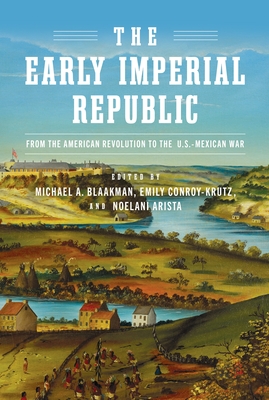The Early Imperial Republic: From the American Revolution to the U.S.-Mexican War

The Early Imperial Republic: From the American Revolution to the U.S.-Mexican War
Created in a world of empires, the United States was to be something new: an expansive republic proclaiming commitments to liberty and equality but eager to extend its territory and influence. Yet from the beginning, Native powers, free and enslaved Black people, and foreign subjects perceived, interacted with, and resisted the young republic as if it was merely another empire under the sun. Such perspectives have driven scholars to reevaluate the early United States, as the parameters of early American history have expanded in Atlantic, continental, and global directions. If the nation's acquisition of Puerto Rico, Guam, and the Philippine Islands in 1898 traditionally marked its turn toward imperialism, new scholarship suggests the United States was an empire from the moment of its creation.
The essays gathered in The Early Imperial Republic move beyond the question of whether the new republic was an empire, investigating instead where, how, and why it was one. They use the category of empire to situate the early United States in the global context its contemporaries understood, drawing important connections between territorial conquests on the continent and American incursions around the globe. They reveal an early U.S. empire with many different faces, from merchants who sought to profit from the republic's imperial expansion to Native Americans who opposed or leveraged it, from free Black colonizationists and globe-trotting missionaries to illegal slave traders and anti-imperial social reformers. In tracing these stories, the volume's contributors bring the study of early U.S. imperialism down to earth, encouraging us to see the exertion of U.S. power on the ground as a process that both drew upon the example of its imperial predecessors and was forced to grapple with their legacies. Taken together, they argue that American empire was never confined to one era but is instead a thread throughout U.S. history. Contributors: Brooke Bauer, Michael A. Blaakman, Eric Burin, Emily Conroy-Krutz, Kathleen DuVal, Susan Gaunt Stearns, Nicholas Guyatt, Amy S. Greenberg, M. Scott Heerman, Robert Lee, Julia Lewandoski, Margot Minardi, Ousmane Power-Greene, Nakia D. Parker, Tom SmithPRP: 483.08 Lei
Acesta este Prețul Recomandat de Producător. Prețul de vânzare al produsului este afișat mai jos.
386.46Lei
386.46Lei
483.08 LeiLivrare in 2-4 saptamani
Descrierea produsului
Created in a world of empires, the United States was to be something new: an expansive republic proclaiming commitments to liberty and equality but eager to extend its territory and influence. Yet from the beginning, Native powers, free and enslaved Black people, and foreign subjects perceived, interacted with, and resisted the young republic as if it was merely another empire under the sun. Such perspectives have driven scholars to reevaluate the early United States, as the parameters of early American history have expanded in Atlantic, continental, and global directions. If the nation's acquisition of Puerto Rico, Guam, and the Philippine Islands in 1898 traditionally marked its turn toward imperialism, new scholarship suggests the United States was an empire from the moment of its creation.
The essays gathered in The Early Imperial Republic move beyond the question of whether the new republic was an empire, investigating instead where, how, and why it was one. They use the category of empire to situate the early United States in the global context its contemporaries understood, drawing important connections between territorial conquests on the continent and American incursions around the globe. They reveal an early U.S. empire with many different faces, from merchants who sought to profit from the republic's imperial expansion to Native Americans who opposed or leveraged it, from free Black colonizationists and globe-trotting missionaries to illegal slave traders and anti-imperial social reformers. In tracing these stories, the volume's contributors bring the study of early U.S. imperialism down to earth, encouraging us to see the exertion of U.S. power on the ground as a process that both drew upon the example of its imperial predecessors and was forced to grapple with their legacies. Taken together, they argue that American empire was never confined to one era but is instead a thread throughout U.S. history. Contributors: Brooke Bauer, Michael A. Blaakman, Eric Burin, Emily Conroy-Krutz, Kathleen DuVal, Susan Gaunt Stearns, Nicholas Guyatt, Amy S. Greenberg, M. Scott Heerman, Robert Lee, Julia Lewandoski, Margot Minardi, Ousmane Power-Greene, Nakia D. Parker, Tom SmithDetaliile produsului










